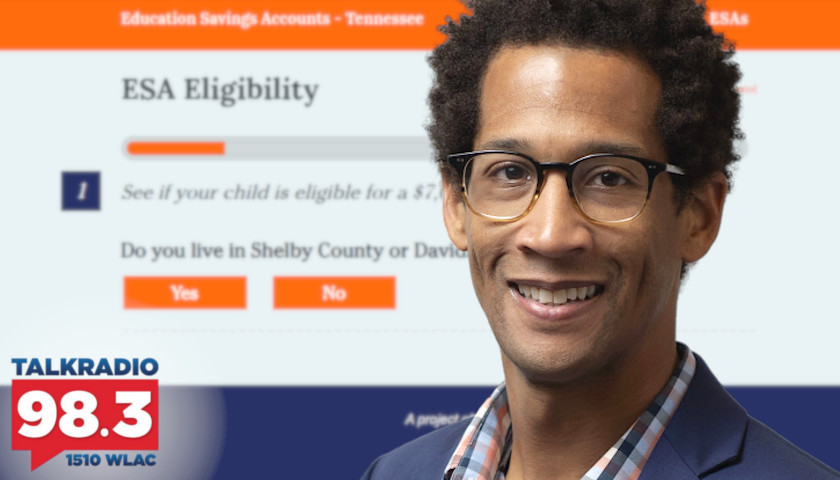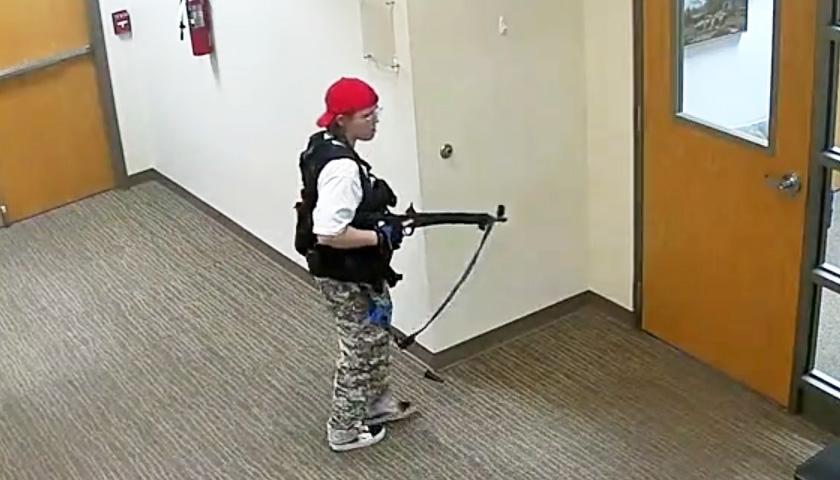Live from Music Row Friday morning on The Tennessee Star Report with Michael Patrick Leahy – broadcast on Nashville’s Talk Radio 98.3 and 1510 WLAC weekdays from 5:00 a.m. to 8:00 a.m. – host Leahy welcomed Tennessee Director the American Federation for Children Shaka Mitchell to the show.
During the third hour, Mitchell gave updates regarding the education savings account (ESA) lawsuit that was challenged unconstitutional mainly by Mayor John Cooper. He stressed how important it was to get the Tennessee Supreme Court ruling on ESA as parents who had applied and already been approved are losing time to make plans for their children in the fall.
Leahy: We are joined now by our good friend the Tennessee State Director for the American Federation for Children. Good morning Shaka.
Mitchell: Hey good morning. Thanks for having me on.
Leahy: We’re delighted to have you on Shaka. We talked to you earlier about the education savings account bill passed last year. Very controversial. There have been some lawsuits involved. The implementation of the program has been delayed. Can you bring our listening audience up to speed on where things are at the moment?
Mitchell: Absolutely. I’ll try to talk about litigation without putting all your listeners to sleep. (Leahy laughs) But I think we can do it. The education savings account program passed last year. What this would do it gives about $7,300 scholarship to students in primarily the Nashville and Memphis areas.
If their parents are not satisfied with their own schools they can take the state money and use it to go to the school of their choice. Well, that passed last May. So more than a year ago Governor Lee signed it into law. Pretty soon after.
Long story short, these cities, Metro Nashville and Shelby County have challenged the law saying that it’s unconstitutional based on something that is called a “home-rule provision.” That’s where we are now. We are now in litigation. Meanwhile, you’ve got a few thousand families who had planned to use it this coming year. There is a lot at stake.
Leahy: A few thousand families primarily in Davidson County and Shelby County want to use this $7,300 that has passed into law. A lawsuit has been filed calling it unconstitutional at the lower court level. It has been declared unconstitutional but it’s going to be appealed probably all the way up to the Supreme Court. What are those thousand or so families doing right now?
Mitchell: Well, that’s a great question. I think for the past two months and I can speak to this because I’m a parent with three school-aged kids. Parents right now are just trying to figure it out. We are trying to figure out what distance learning looks like, learning from home, whatever you want to call it. A poll that we put out recently said that 40% of parents said they are more likely to homeschool in the fall then they were previously.
So right now the parents who have signed up for the ESA program are kind of waiting. They are waiting for the courts. We are hopeful that the Tennessee Supreme Court will take up the case quickly so that they can continue to register. Because now is the time you have to register for school and you want to have that set before August comes. Right now they are kind of in limbo.
Carmichael: And when they register they registering at private schools that accept them?
Mitchell: Yes that’s right. You’d be doing two things at once really. If you are a family who wants to participate you would apply for the ESA, the program itself. And then you kind of go shopping. Just like any other family, you would go visit schools which obviously is really hard right now because of COVID. A lot of schools are doing virtual tours. You can still connect with school administrators. Right now parents would be kind of shopping if you will for the right school for their kids.
Carmichael: What qualifies them? You said the first thing they have to do is they have to apply and qualify for the grant. What qualifies them? Who is eligible?
Mitchell: So the way that the law is written is that to be eligible you have to be zoned for Nashville public schools or a Shelby County schools or something called the achievement school district. That’s one of the lowest-performing schools in the state. The bottom five percent. You have to be zoned for one of those two districts. Then there are some income restrictions were a family of four, for instance, you have to be in the income threshold which is about $67,000 for a family of four.
Carmichael: Let me be sure that I understand what you are saying. What you are saying is that the state passed a law to allow parents whose children are in known failing schools and these are parents who don’t have the income themselves to get their children out of the failing school and into a private school…
You are saying legislation passed to give these families the opportunity to get a better education for their children and Davidson County and Shelby County are suing to stop that? Who in Davidson County, what is the institution in Davidson County and Memphis, Shelby County that is suing?
Mitchell: Yes. Here in Davidson County where I live it is the Metro Nashville government. So it is Mayor Cooper, the main party, and the school board joined that suit. Here’s what they said if you can believe this. They said just this week in a legal brief to the Supreme Court. They said that the status quo doesn’t harm parents. And I beg to differ. You figure in Nashville less than one in four can read on grade level.
Carmichael: Now wait, these are the failing schools though?
Leahy: Yes.
Mitchell: Yes.
Carmichael: So this is the same mayor that applies data and science to his health policies in regard to COVID. What data and science is the school board and the city of Nashville using to apply to try to claim that the school that is deemed by the authorities to be a failing school, what is the data and science that shows that they are in fact not failing?
Mitchell: Yes. You let me know when you find it. (Leahy laughs)
Leahy: The data is exactly the opposite isn’t it?
Carmichael: Gosh.
Mitchell: This has always been about families and parents having a choice for their kids. Unfortunately for the other side this really became evident in the legal argument. On the other side, it’s more about elevating money and government over the needs of families. Ironically or maybe un-ironically the city of Nashville talks about this being a local control issue. Well, nothing is more local than the families.
That’s where the control needs to be. And I think you are seeing this with COVID right now, this isn’t a matter of whether or not parents are sophisticated enough to do it. You’ve got parents of families across the economic spectrum who are out of work right now and can’t go to work for whatever reasons. Businesses have been shut down and they are trying to find some options to make things work.
Carmichael: You said that the city and the Metro Board of Education filed a brief or something to the Supreme Court. So is it going to the Supreme Court now?
Mitchell: The date set for the Tennessee Court of Appeals, intermediate court. But the attorney general our partners like the Beacon Center and the Liberty and Justice Center has appealed to the Tennessee Supreme Court and we’ve asked them to take it early because there is no time to wait.
Carmicheal: Right. You’ve got the school year coming up.
Leahy: The school year would be scheduled for August.
Carmichael: All of the parties actually need to know what the ground rules are and those ground rules will be ultimately determined by the ruling from the Supreme Court.
Mitchell: Absolutely. And consider the fact with COVID, you’ve got schools that are trying to figure out how to have fewer kids in classes. This is actually be something for safety reasons you would want fewer kids in public schools right now.
Carmichael: That would be true but would be a short term argument. The larger argument that the courts are going to have to resolve is whether or not the statute that was passed by the state and signed by the governor whether or not it is legal under our constitution. I’m not a lawyer but I hope that the Supreme Court finds it to be legal because I think parents whose children are known to be in failing schools need to have an option.
Mitchell: The claim is that this violates what’s called the home-rule. The idea that you can’t have a state law that applies to just one county. But in fact, this law asks nothing of Nashville or Shelby. In fact, we are saying hey, don’t do anything. We want the parents to have a choice here. We are asking you to not educate these kids so the children can actually go to the schools of their choice.
Leahy: What is your best guess of the earliest that the state Supreme Court might decide on this?
Mitchell: I think the state supreme court could decide this summer. I think you could see a ruling feasibly in June and this program could stay on track. Even at the trial court level, the chancellor saw that this was a pressing issue. And so I think we could still have a ruling that happens quickly which would allow parents to use it.
Leahy: How many people applied for the grant? And how many grants are available in Davidson County?
Mitchell: At last count, there were just shy of 2,700 students who had applied for these.
Leahy: Is that both Davidson and Shelby County or just Davidson County?
Mitchell: In both.
Leahy: In both counties.
Carmichael: And how many are available?
Mitchell: Available there are about 5,000.
Leahy: They could all do that.
Mitchell: I would think the number would go a little bit higher.
Leahy: We’ll cross our fingers the state supreme court gets it. When this has an update will you come back and share that information with us?
Mitchell: I’d love to. Thank you.
Listen to the full third hour:
– – –
Tune in weekdays from 5:00 – 8:00 a.m. to the Tennessee Star Report with Michael Patrick Leahy on Talk Radio 98.3 FM WLAC 1510. Listen online at iHeart Radio.
Photo “Shaka Mitchell” by American Federation for Children.









So Memphis and Nashville are both suing to stop a program that MIGHT give some of their poorer families, who are likely predominately black, with kids in failing schools, the opportunity to get their kids a better education.
Aren’t both of these cities run by DEMOCRAT mayors, WHITE Democrat mayors?
Looks to me like this is just another data point indicating where the vestiges of racism in America reside…within the also predominately white leadership of the Democrat Party! The same Democrat Party that railroaded Representative John DeBerry of Memphis.
This is shameful!